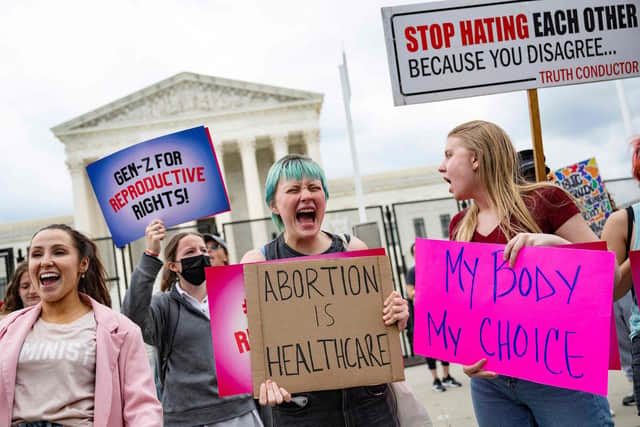Abortion: 'The stakes could not be higher' - Dani Garavelli
A precedent to cling to, not because it is incontestable, but because, for almost 50 years, it was contested again and again, and remained unbowed. Religious fundamentalists could huff and puff, but they couldn’t blow the house down because, in 1973, the Supreme Court had ruled the right to an abortion was protected by the constitution.
Until recently, the idea this right could be rescinded was almost unthinkable. Across the west, the way women’s biology had been used to oppress them was being exposed and condemned. Think of the Magdalene Laundries: the shame of Ireland. Was any country ever more tethered to its religious heritage? And yet, in less than a decade, its population rejected those prejudices, voting to repeal its abortion ban by a convincing 66 per cent.


Advertisement
Hide AdAdvertisement
Hide AdOutliers (Poland, Malta, Lichtenstein) aside, the US and Europe were becoming more not less progressive. There would always be extremists attempting to chip away at time limits, but, in most countries, there was a mainstream consensus on abortion, with “pro-lifers” on the margins.
It is worth remembering, too, that, in 1973, five of the seven Supreme Court judges who backed choice were Republican-nominated. In the US, 69 per cent of the population continue to support that decision. More recently, however, as the GOP lurched to the right, it became obvious it had Roe v Wade in its sights.
Once pro-choice, Donald Trump reversed his position en route to the White House, then proceeded to stack the Supreme Court in his favour, nominating right-wingers Neil Gorsuch and Brett Kavanaugh as new justices. Liberal Ruth Bader Ginsburg saw the car crash coming, albeit too late. Her last wish was that she should outlive Trump’s presidency so a Democrat could appoint her successor. But she died in September 2020 and was replaced by Catholic mother-of-seven Amy Coney Barrett.
The nomination hearings were a masterclass in equivocation. The would-be justices paid lip service to Roe v Wade without guaranteeing to uphold it. Conservative states smelled change in the air and began to push back as a provocation. It was Mississippi’s attempt to ban most abortions after 15 weeks which ended up at the Supreme Court.
Written by Justice Samuel Alito, last week’s leaked draft majority opinion overturned Roe v Wade, allowing states to go their own way. Most terrifying was the unhinged way in which he expressed himself. Using the word “abortionists,” and citing 18th century sources such as “The Gentleman’s Magazine”, he came across less like a judge carefully weighing up the pros and cons and more like a crank venting on Facebook.
Yet the stakes could not be higher. Striking out Roe v Wade would have a profound effect on women’s lives. At least 25 states want to severely restrict or outlaw abortion, with some favouring a ban even where the foetus is not viable and the mother’s life is in danger. Thirteen states have introduced abortion trigger laws which would be enacted immediately.
As a result, millions of women would be forced to travel long distances to obtain an abortion, increasing their trauma and causing backlogs in those states where it is still legal. The decision would mark a return to the kind of cruelty inflicted on Savita Halappanavar, who died in Galway in 2012 after doctors refused to abort the foetus she was in the process of miscarrying. Halappanavar's death changed everything in Ireland, but apparently holds no horror for the US Supreme Court.
Alito’s opinion also opens up the possibility that women will be criminalised for behaviour regarded as dangerous to a foetus such as drinking, smoking or taking antidepressants.
Advertisement
Hide AdAdvertisement
Hide AdSo what can people do? Well, at present the draft opinion is supported by five out of the nine Supreme Court judges, but there is time for minds to be changed. Thousands of women have already taken to the streets in protest. If this does not work, pro-Choice campaigners will be pushing Congress to pass a law that replaces Roe v Wade, making abortion legal in every state.
But this is not just a problem for the US. If there is one thing the last few years have demonstrated, it is that even values we regard as axiomatic can be upended by populists. The culture war knows no boundaries; everywhere is a potential Gilead.
In the wake of last week's leaked opinion, Boris Johnson's spokesperson said the government "fully supported the right to access safe and legal abortion”. Nicola Sturgeon said the right of women to decide what happens to their bodies was a human right.
Yet neither government has intervened to stop placard-wielding protesters standing outside abortion clinics in an attempt to intimidate women going in. The SNP included a pledge to introduce abortion buffer zones in its manifesto, but has not acted on it. SNP MSP, John Mason, has attended one of these “prayer vigils” and recently asked why the state should restrict him speaking to God.
While the party dithers, the protests grow, emboldened, no doubt, by events in the US. Last month, more than 100 activists gathered on a road approaching the Queen Elizabeth University Hospital in Glasgow. It is no coincidence that this protest was organised by Texas-based group 40 Days of Life.
Sturgeon says the buffer zones are being hindered by human rights laws. But there's a question here about whose human rights are prioritised. If the right to harass is being placed above the right to access healthcare, then perhaps we are not so far removed from the US after all.
Comments
Want to join the conversation? Please or to comment on this article.
